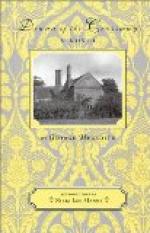His exhibition of his enemy Lord Dannisburgh, is of the class of noble portraits we see swinging over inn-portals, grossly unlike in likeness. The possibility of the man’s doing or saying this and that adumbrates the improbability: he had something of the character capable of it, too much good sense for the performance. We would think so, and still the shadow is round our thoughts. Lord Dannisburgh was a man of ministerial tact, official ability, Pagan morality; an excellent general manager, if no genius in statecraft. But he was careless of social opinion, unbuttoned, and a laugher. We know that he could be chivalrous toward women, notwithstanding the perplexities he brought on them, and this the Dorset-Diary does not show.
His chronicle is less mischievous as regards Mrs. Warwick than the paragraphs of Perry Wilkinson, a gossip presenting an image of perpetual chatter, like the waxen-faced street advertizements of light and easy dentistry. He has no belief, no disbelief; names the pro-party and the con; recites the case, and discreetly, over-discreetly; and pictures the trial, tells the list of witnesses, records the verdict: so the case went, and some thought one thing, some another thing: only it is reported for positive that a miniature of the incriminated lady was cleverly smuggled over to the jury, and juries sitting upon these eases, ever since their bedazzlement by Phryne, as you know . . . . And then he relates an anecdote of the husband, said to have been not a bad fellow before he married his Diana; and the naming of the Goddess reminds him that the second person in the indictment is now everywhere called ’The elderly shepherd’;—but immediately after the bridal bells this husband became sour and insupportable, and either she had the trick of putting him publicly in the wrong, or he lost all shame in playing the churlish domestic tyrant. The instances are incredible of a gentleman. Perry Wilkinson gives us two or three; one on the authority of a personal friend who witnessed the scene; at the Warwick whist-table, where the fair Diana would let loose her silvery laugh in the intervals. She was hardly out of her teens, and should have been dancing instead of fastened to a table. A difference of fifteen years in the




